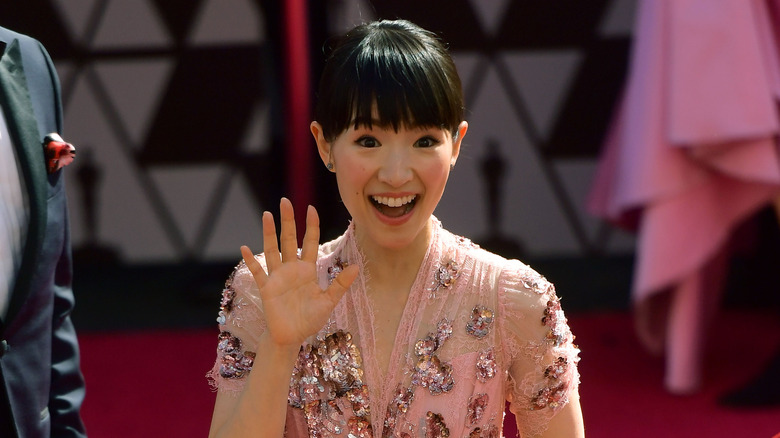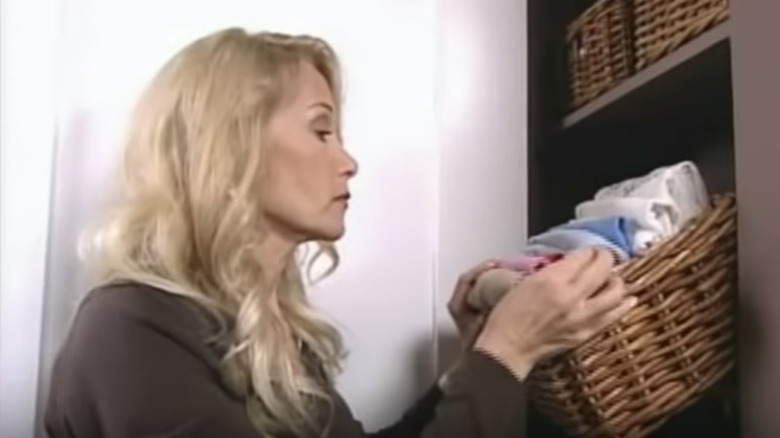Did Marie Kondo Actually Steal Her Folding Method?
We may receive a commission on purchases made from links.
A lot happened in 2014 — the polar vortex was a big (very cold) thing, we all took part in the ALS Ice Bucket Challenge, and we were introduced to the Apple Watch (via Mashable). 2014 was also the year Marie Kondo hit the scene with her book, The Life-Changing Magic of Tidying Up.
Her methods were so popular the book became a New York Times bestseller and as a result, Kondo made it to Time's 100 Most Influential people list in 2015. Her book got an endorsement from Jamie Lee Curtis who called Kondo a "modern-day 'Marie Poppins'" who wrote "a literal how-to-heave-ho," and said, "I recommend it for anyone who struggles with the material excess of living in a privileged society." Kondo also became so synonymous with tidying up she became part of American pop culture in 2016 when Emily Gilmore tried to KonMari her mansion in the 2016 Gilmore Girls revival (via Rolling Stone).
Marie Kondo sparks joy on Netflix
New York Times book reviewer Penelope Green, who called Kondo "a kind of Zen Nanny" and admitted that her review may have helped Kondo skyrocket onto the bestseller lists, told Vox that she loved Kondo's "notion that your things, even your socks, were nearly animate, and deserved compassion and respect. All that folding and twirling and stacking made my drawers and shelves and closets so beautiful. It was soothing to just look at everything all rolled up and spare."
Things got even bigger for Marie Kondo in 2019, when Netflix released Tidying Up with Marie Kondo. The KonMari method really took off then, and "sparking joy" became a thing. Rolling Stone says "spark joy" is really just another way to say "tokimeku," a Japanese word that roughly translates to "heart aflutter."
But Marie Kondo didn't spark joy for everyone. While most of the world has fallen in love with Kondo and her KonMari method, not everyone is thrilled with the professional organizer.
Marie Kondo has her critics
Book lovers were ready to do battle with Kondo when they thought she was suggesting they should cull their (probably more than extensive) collections. Novelist Anakana Schofield tweeted: "DO NOT listen to Marie Kondo or Konmari in relation to books. Fill your apartment & world with them. I don't give a s***e if you throw out your knickers and Tupperware but the woman is very misguided about BOOKS. Every human needs a v extensive library not clean, boring shelves."
Kondo was also heavily criticized for her stand against hanging onto things with sentimental value and she's not a fan of giving things to friends and family (unless they ask of course). Arielle Bernstein calls simplicity a hot trend and says especially for some people, "putting things in order" simply doesn't equate to just throwing things away" (via The Atlantic).
This lady is especially unhappy with Marie Kondo
One person in particular isn't buying into the KonMari method, or at least the now ubiquitous Kondo tri-folding technique. That's because Linda Koopersmith, who is also known as "The Beverly Hills Organizer" says the upright fold is not Kondo's, its hers — and she's been using the so-called KonMari fold for most of her career.
Koopersmith says she invented the upright fold in 1992 for her daughter (who was then 3 years old), so her child could see everything in her drawers. "What Marie calls her KonMari Method, is actually a folding technique created by me 27 years ago. It was published in my book in 2005, it was shown on the TV show Clean House for years and seen on YouTube videos," Koopersmith said in June 2019 (via Page Six).
Is it really the Koopersmith folding method?
As proof, Clean House co-host Allen Haff uploaded a video on YouTube showing Koopersmith organizing various closets for the show. The clip also came with the caption: "These clips demonstrate that Linda's 'upright folding technique' was featured frequently on Style's #1 rated TV program. While other newcomers may claim credit for this innovation Linda is proud to have inspired the shows millions of fans and she looks forward to sharing more of her original patented organizing technology in the future."
Aside from being a regular on Clean House, which ran from 2003 to 2005 on The Style Network, Koopersmith has also written a book on home organizing. House Beautiful says her A-list client roster includes celebrities like Chrissy Teigen and John Legend, Serena Williams, Jennifer Lopez, and Khloé Kardashian.
What do home organizing audiences have to say about the controversy? YouTuber annieway35 comments, "I remember this show and I remember that folding technique... There's no such thing as an original idea but you should give credit where credit is due Marie Kondo."




